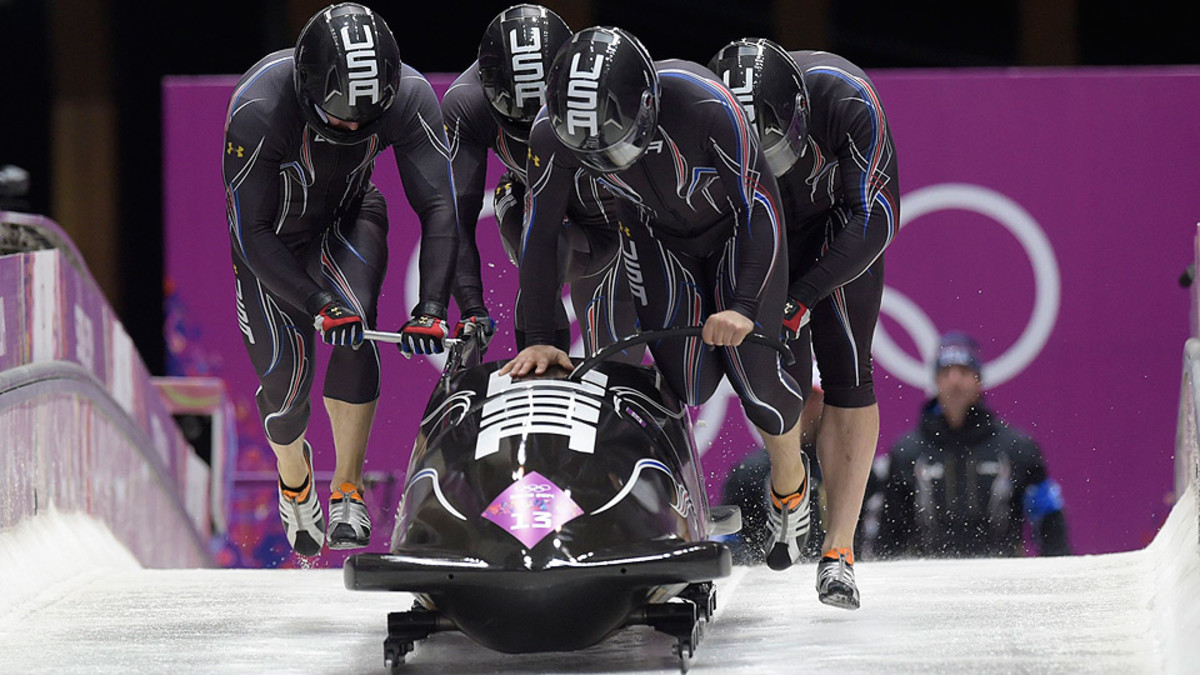Bobsledder Johnny Quinn finally gets on the track in Sochi
SOCHI -- It took two weeks for him to do it, but Johnny Quinn, the U.S. bobsledder who touched off inevitable headlines about being the Sochi Olympics’ “breakout star,” finally made the kind of news he came to Russia for.
Tonight he climbed into the USA-2 four-man sled as one of three pushers for driver Nick Cunningham.
Things didn’t go as planned. USA-2 sits 11th out of 30 sleds after two of the competition’s four heats. But Quinn was relieved to be finally fielding questions about his sport.
Quinn, you’ll recall, is the guy who, before the games began, might have simply escaped from a locked bathroom by punching a hole through the door. But he did more: He tweeted out a picture of his route to freedom, and several days later shared a photo from inside an elevator in which he got briefly stuck too. “It’s really opened the door -- no pun intended -- to inspiring young people,” he said. “At 26 I’d been cut three times [by NFL and CFL teams] and had a bum knee. Now I’m 30 and an Olympian.”
He and his serial confinements persisted as a social-media sideshow. Quinn retweeted messages of solidarity from William Shatner and Gilbert Gottfried. He took questions from Piers Morgan and Ryan Seacrest. He shared other people’s video re-enactments of his lavatorial leavetaking, and his exploits spawned a verb: In the same way you might jerry-rig something, you can bust it all to pieces by johnny-quinning it.
Alas, something broken also figured in USA-2’s disappointing showing on Saturday night. Drivers steer a bobsled by gripping two handles, each shaped like the letter D, attached by bungee cords to the runners. In Curve Seven of the first heat, Cunningham discovered that one D-ring had cracked.
He made the best of things, gripping the bungee in his hand until the end of the run. “I wish I could blame that for us being nine-tenths [of a second] behind,” said Cunningham, who’s piloting Night Train, the sled designed by NASCAR legend Geoff Bodine’s team that Steve Holcomb drove to the gold medal in Vancouver four years ago. “But I can’t. We know this sled’s a winner. We just have to make it go faster.”
Knowing that his misadventures had the potential to morph from a curiosity into a distraction, Quinn had reassured his sledmates that he wouldn’t let that happen. “Day One we were on the ice, Johnny came to us and said, ‘Listen, it’s game time,” Cunningham said. “We all had fun, but we’re here to compete.’
“For the first time in four years, America knew what four-man bobsled was. And we’ll take that.”
There’s a bobsledding backstory to Quinn, who’s the all-time leading receiver at North Texas. Like many Americans, he had encountered the sport only quadrennially and seen the movie Cool Runnings. He first got into a sled in part because his agent also represented Olympic bobsledder Todd Hays, who like Quinn is an ex-football player from Texas. Though he’s known around the weight room at Lake Placid’s Olympic Training Center for a record-setting powerlift, he does have a weakness: His first time in a sled he got so nauseous that he had to take Dramamine to do it again. Now the U.S. Olympian with the macho reputation simply closes his eyes. “I’m a push athlete,” Quinn says. “After five seconds I get in and my job’s over. Fortunately, Nick has his eyes open.”
Quinn’s original genius was to slot himself into the early narrative of these Olympics, finding a place for his original hashtag, #SochiJailBreak, in the slipstream of #SochiProblems. Thus his destruction of that bathroom door seemed less an example of ugly Americanism than of praiseworthy American pragmatism.
By Week Two, another hashtag altogether -- #Quinning -- helped turn what could have been 15 minutes of fame into a full fortnight’s.
USA-2 won’t be #Quinning a medal during the final two heats. If any American sled wins one, it will be Holcomb’s, USA-1, a.k.a. Night Train II, which stood fourth after two heats, one slender hundredth of a second behind Germany-1, and .13 behind Latvia-1 and .17 behind Russia-1. “An attack from the back,” Holcomb said. “Hopefully, they won’t see us coming.”
Meanwhile Quinn schleps sleds and leads cheers for Holcomb, who last week won a bronze medal in the two-man. The hope is that the U.S. team’s star driver, despite nursing a strained calf muscle, can slip back onto the podium tomorrow after the U.S. spent Saturday going its first full day in Sochi without a medal.
It’s all about the team now, so Quinn won’t go into details. But his agent, he reports, does have a few things “in the pipeline.”





